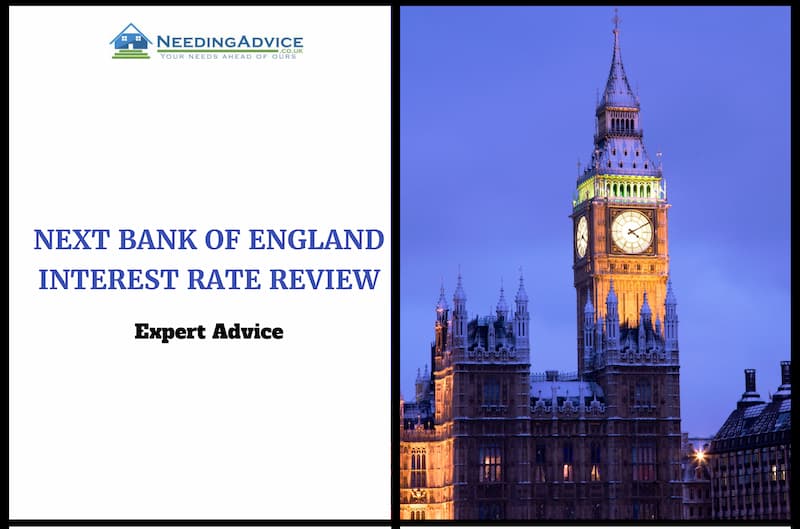The next Bank of England interest rate review has mortgage holders, savers, and investors closely watching for changes that could affect everything from borrowing costs to financial stability.
At each review, the Bank of England’s Monetary Policy Committee (MPC) examines key economic indicators—including inflation, employment, and market expectations—to decide whether to adjust the base rateThe interest rate set by the Bank of England, affects the in.... This base rate directly influences mortgage rates, savings rates, and broader financial conditions in the UK.
With interest rates at levels not seen since before the Covid-19 pandemic, homeowners, prospective buyers, and anyone with a mortgage are especially eager to understand how the MPC’s upcoming review might impact mortgage repayments, savings, and the overall cost of living. Let’s explore what’s likely to happen at this policy meeting and what it could mean for your finances.
With interest rates at levels not seen since before the Covid-19 pandemic, homeowners, prospective buyers, and anyone with a mortgage are especially eager to understand how the MPC’s upcoming review might impact mortgage repayments, savings, and the overall cost of living. Let’s explore what’s likely to happen at this policy meeting and what it could mean for your finances.
Understanding the Bank of England’s Rate Decision Process
Every six weeks, the Bank of England’s MPC meets to review the current base rate in the context of economic conditions. The committee’s objective is to ensure price stability and maintain inflation at around 2% over the medium term, while also supporting economic growth. Key indicators of inflation persistence and economic slack guide this decision, as do measures like headline inflation, Twelve-month CPI inflation, and trends in labour market activity.
Why the Interest Rate Matters: The Bank Rate (or base rate) serves as the benchmark rate that banks and building societies use to determine mortgage, loan, and savings rates. When the Bank Rate increases, it typically leads to higher borrowing costs and mortgage interest rates, while a decrease can signal more favorable conditions for borrowers. However, an interest rate increase also improves savings rates and can curb spending, which helps control inflationary pressures.
Current Economic Indicators Influencing the Review
As we move towards the next rate decision, a few economic indicators are likely to influence whether rates will go up, stay the same, or come down. Let’s look at the most significant of these factors.
•Inflationary Pressures: With core inflation and services consumer price inflation remaining elevated, there is strong pressure on the Bank to implement a restrictive stance to avoid further price rises. While food prices, oil prices, and energy prices show some fluctuation, persistent inflation across services sectors indicates that inflation persistence could be a concern over an extended period.
•Labour Market Conditions: The UK’s labour market remains relatively tight, with low unemployment rates and steady wage growth. High employment can drive consumer demand and contribute to domestic inflation. However, with the Bank seeking signs of a looser labour market as a signal of easing demand, there is ongoing debate about how tight or slack the current labour market actually is.
•Economic Slack and Consumer Confidence: Economic slack—spare capacity in the economy—indicates how much room there is for growth before inflation rises. Low consumer confidence and retail sales volumes suggest that consumers are feeling the pinch of high living costs, which could influence the Bank’s rate-setting stance.
•International Economy and Import Prices: With the global economy experiencing fluctuations, particularly in the Euro-area GDP and US Federal Funds Rate, the Bank considers international factors, including import prices and effective exchange rates.
Potential Outcomes of the Bank of England’s Next Meeting
Financial analysts and market participants are divided on what might happen in the next review. Some believe the Bank will continue its gradual approach to rate rises, while others predict a rate cut to counterbalance weak consumer demand. Here are the possible outcomes:
•If Rates Rise: A rise in the Bank Rate would likely lead to higher mortgage payments, especially for those on variable-rate and tracker mortgages. This move is aimed at curbing inflation but would increase the cost of borrowing across the board, including fixed-rate mortgages up for renewal. An increase also often improves savings rates, which can benefit deposit holders.
•If Rates Are Unchanged: If the MPC decides to hold rates steady, it may be a signal that they believe current levels of restrictiveness are sufficient to moderate inflation. While this would provide temporary relief to homeowners, financial markets may interpret it as a sign of caution or economic uncertainty.
•If Rates Are Cut: While unlikely given the current inflationary landscape, a rate cut would lower mortgage and loan rates, making borrowing cheaper. However, this approach could have downside risks by potentially stoking inflation further if demand increases.
How a Rate Change Could Impact Mortgages
Any adjustment to the base rate has direct implications for mortgage holders. Here’s what different types of mortgage holders should consider:
1.Variable and Tracker Mortgages: Borrowers on variable and tracker rates will see their monthly payments adjust according to the base rate. For instance, a 0.25% rate hike might lead to an increase in monthly payments, depending on the loan amount and remaining term. Over time, even small changes can add up to substantial additional costs.
2.Fixed-Rate Mortgage Holders: Those with fixed-rate mortgages remain protected from immediate rate hikes, as their rates are locked for a specified term. However, when it comes time to remortgageRefinancing an existing mortgage with a new mortgage., higher base rates could mean less favorable fixed-rate deals. Securing a competitive deal early can shield homeowners from anticipated rate increases.
3.New Buyers and Prospective Borrowers: First-time buyers and those seeking new mortgages may face higher costs due to increased borrowing rates and tighter affordability assessments by lenders. Given the potential for additional rate hikes, some prospective buyers might consider locking in a fixed-rate mortgage deal to avoid future increases.
What Savers and Investors Can Expect
While a rate rise generally benefits savers by increasing savings account and ISA returns, the benefits may not be immediate or uniform across all financial institutions. Some commercial banks raise rates quickly, while others may delay adjustments.
Investors, on the other hand, could see mixed results. Higher rates often create downward pressure on equityThe difference between the value of the property and the amo... prices as companies face increased costs. However, bonds, particularly government bonds, may become more attractive to conservative investors seeking higher yields.
What Homeowners and Buyers Should Consider as the Rate Review Approaches
With the rate review around the corner, homeowners and buyers can take proactive steps to prepare for potential rate changes. Here’s what you might consider:
•Consider Fixed Rates for Stability: Fixed-rate mortgages offer protection from sudden increases in borrowing rates and can be valuable for those seeking budget stability. The average two-year fixed mortgage rate has been climbing, so securing a rate early can mitigate future risks.
•Overpayments to Reduce Principal: Making additional payments on your mortgage can reduce the principal balance, lessening the impact of future rate increases. Many lenders allow for annual overpayments up to a set limit without penalties.
•Review Savings and Investment Strategies: With savings rates likely to improve if the Bank Rate increases, consider transferring funds to accounts offering higher interest. Those investing in bonds might benefit from short-term bonds, as they are sensitive to interest rate fluctuations.
•Seek Professional Mortgage Advice: A mortgage broker can provide insight into market trends, help you secure a competitive deal, and guide you through complex decisions. Brokers often have access to exclusive products across multiple lenders, which can simplify the search for a suitable mortgage.
Conclusion: Navigating the Impact of the Bank of England’s Next Rate Review
The next Bank of England interest rate review is poised to shape the financial landscape for homeowners, prospective buyers, and savers alike. With inflationary pressures, labour market tightness, and international economic conditions all playing roles, the MPC’s decision will have a ripple effect across mortgage rates, savings accounts, and the overall cost of living. By staying informed and planning strategically, individuals can mitigate potential impacts, whether the Bank opts to increase, hold, or cut the base rate.
In the coming months, keep an eye on economic indicators, consult with a mortgage adviser as needed, and explore ways to manage your mortgage and savings in a shifting rate environment. Whatever the Bank’s decision, preparing for the outcomes now can provide financial stability and peace of mind.






